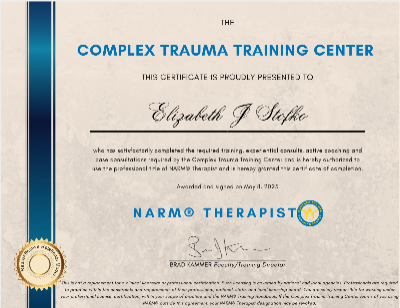ABOUT LIZ
Hello! I'm Liz. I'm a licensed associate therapist (LAPC), NARM® Master Therapist, breathwork facilitator, MBEC, and certified trauma professional. I am passionate about destigmatizing mental health and helping others better understand themself, their body, their brain, and their habits to cope with difficulties in life, reach their goals, and live in a state of acceptance and compassion rather than overwhelm, frustration, and shame.
While I focus on all aspects of mental wellness, my specialties are in nutritional psychology (understanding how our brain and mindsets influence our habits, actions, and choices regarding health and wellness), relational trauma, complex trauma, chronic illness support, and nervous system regulation.
From a very young age, I struggled with crippling anxiety and panic attacks. My inability to cope with my anxiety was a contributing factor in developing an eating disorder later on in life, which ultimately led to the onset of multiple chronic illnesses (dysautonomia, Fibromyalgia, CFS) and symptoms that impacted my life in difficult ways for years in my early twenties. While difficult to endure, these experiences are what brought me to this field and led me to become so passionate about psychology, mental health, and the relationship we have with ourselves.
My undergraduate degree is in early childhood education and special education and while I did not stick on this career path, my degree played a large role in my passion for understanding human development, as the majority of our belief systems, habits, and identities stem from childhood and early life experiences. After college, I decided to pivot and joined a mental health counseling graduate program to become a licensed therapist. I have also completed several trainings and certifications in trauma, nutritional psychology, eating disorder support, and nervous system regulation.
Through my work as a therapist, social media platforms, and blog, I aim to shift the way we view health and wellness, destigmatize mental health and make resources more accessible, spread awareness and acceptance for those affected by psychological disorders, and advocate for those with chronic illnesses.
Facing the parts of ourselves we are disconnected from, fearful of, feel shame towards, etc. is not easy, but the connection to ourselves and others that we gain is worth it. I take a non-pathologizing approach to mental health and personal growth, meaning, viewing people through the lens of compassion and acceptance instead of judgment. I understand the impact that our environment has on our development and the way we function throughout life. I operate from the belief that all people have inherent worth and dignity, and everyone is capable of building resilience and making positive changes in their lives.
I am grateful that my healing journey connected me to my passion for helping others and am honored to be a part of your healing process, whether it is through working together, one of my programs or offers, or my free content ♥︎
Pillars of My Therapeutic Approach:
These are the core values that shape everything I offer — from individual and group therapy to courses, programs, and digital resources. They reflect what I believe is most essential for meaningful, sustainable healing and growth.
1. Psychoeducation: You'll learn practical, relevant insights from psychology, neuroscience, mindfulness, nervous system regulation, etc. that are helpful to the content covered. I break these concepts down into simple, applicable pieces — helping you better understand your brain, your body, and your patterns.
2. Agency: You know yourself best. No one else lives in your body, experiences your life, or feels your emotions. Growth requires some discomfort, but should never override your own readiness or feel so intense that it puts you in “freeze” mode. You set the pace. My role is to support you in honoring your inner wisdom and choosing what feels truly supportive for you.
3. Acceptance: Healing isn’t linear — it’s layered. Like peeling an onion, growth reveals itself over time. The goal isn’t perfection or a “finished” version of you, but learning to meet yourself with compassion in every phase. Acceptance lets you respect and care for your body and mind now, not just once you've “arrived.”
4. Curiosity: Even our most frustrating and destructive self-sabotaging habits and actions formed for a reason and at one point in our lives served a very important purpose. Rather than judging or shaming yourself, we’ll explore your inner world with openness. Curiosity helps you understand what drives your behavior, how you relate to yourself and others, and how your past continues to shape your present.
5. Embodiment: True change doesn’t just happen in the mind — it happens in the body. Since trauma, fear, and resistance live in the body, we use gentle embodiment practices to support nervous system regulation and create space for deeper, more sustainable transformation.
Blog Posts
Check out my most recent blog posts here:









